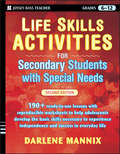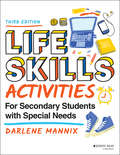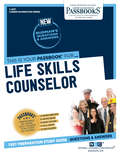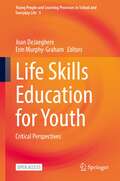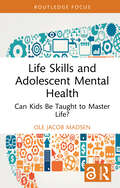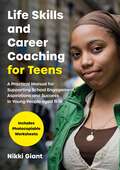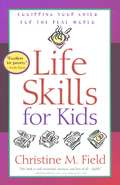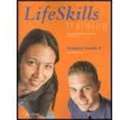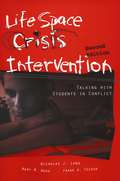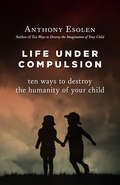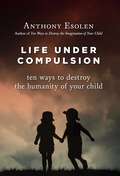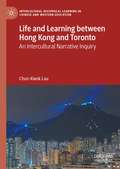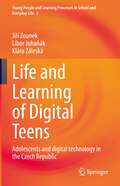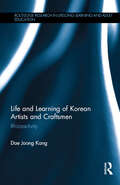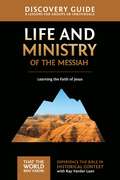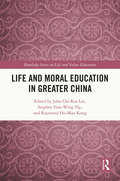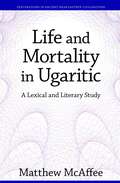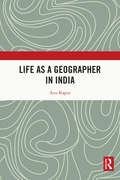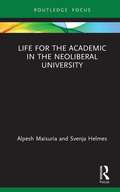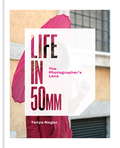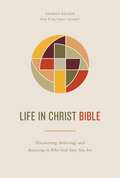- Table View
- List View
Life Skills Activities for Secondary Students with Special Needs
by Darlene MannixReady-to-use lessons for teaching basic life skills to adolescents with special needs This book offers teachers and parents a unique collection of more than 200 worksheets to help adolescents with special needs build the life skills they need to achieve independence and succeed in everyday life. The book provides 22 complete teaching units focusing on basic life skills such as handling money, succeeding at school, using the Internet safely, getting and keeping a job, and much more. The book contains 90 reproducible worksheets for teaching students how to apply these life skills to real-life situations. A revised and updated edition of the classic book for teaching basic life skills to adolescents with special needs Includes complete teaching units with reproducible worksheets and discussion questions that teach basic life skills Offers ideas for fostering skills like using the Internet, handling money, succeeding at school, getting and keeping a job, and more Mannix is the best-selling author of Social Skills Activities for Special Children, Life Skills Activities for Special Children, and Writing Skills Activities for Special Children
Life Skills Activities for Secondary Students with Special Needs
by Darlene MannixHelp students with special needs thrive with over 160 updated educational activities In the newly revised Third Edition of Life Skills Activities for Secondary Students with Special Needs, teacher and author Darlene Mannix delivers a unique collection of over 160 updated activity sheets with related exercises, discussion questions, and evaluation suggestions to help students gain basic skills necessary for independence and success. Each activity sheet focuses on a specific skill in a real-world context and includes teacher directions for objectives, introduction, optional extension activities, and assessment methods. This crucial book includes: Activity sheets and corresponding introductions in a wide variety of critical life skills such as interpersonal, communication, academic and school, practical living, and more Coverage of leisure activities and the importance of finding fulfilling hobbies and pastimes Tools to help students build their self awareness and understand their strengths and weaknesses Perfect for special educators, general education teachers, school counselors, and psychologists, Life Skills Activities for Secondary Students with Special Needs will also earn a place in the libraries of other professionals working with special needs children, as well as the parents of those children.
Life Skills Counselor: Passbooks Study Guide (Career Examination Series)
by National Learning CorporationThe Life Skills Counselor Passbook® prepares you for your test by allowing you to take practice exams in the subjects you need to study. It provides hundreds of questions and answers in the areas that will likely be covered on your upcoming exam.
Life Skills Education for Youth: Critical Perspectives (Young People and Learning Processes in School and Everyday Life #5)
by Joan DeJaeghere Erin Murphy-GrahamThis open access volume critically reviews a diverse body of scholarship and practice that informs the conceptualization, curriculum, teaching and measurement of life skills in education settings around the world. It discusses life skills as they are implemented in schools and non-formal education, providing both qualitative and quantitative evidence of when, with whom, and how life skills do or do not impact young women’s and men’s lives in various contexts. Specifically, it examines the nature and importance of life skills, and how they are taught. It looks at the synergies and differences between life skills educational programmes and the way in which they promote social and emotional learning, vocational/employment education, and health and sexuality education. Finally, it explores how life skills may be better incorporated into education and how such education can address structures and relations of power to help youth achieve desired future outcomes, and goals set out in the Sustainable Development Goals (SDGs). Life skills education has gained considerable attention by education policymakers, researchers and educators as being the sine qua non for later achievements in life. It is nearly ubiquitous in global and national education policies, including the SDGs, because life skills are regarded as essential for a diverse set of purposes: reducing poverty, achieving gender equality, promoting economic growth, addressing climate change, fostering peace and global citizenship, and creating sustainable and healthy communities. Yet, to achieve these broad goals, questions persist as to which life skills are important, who needs to learn them, how they can be taught, and how they are best measured. This book addresses these questions.
Life Skills and Adolescent Mental Health: Can Kids Be Taught to Master Life? (Routledge Focus on Mental Health)
by Ole Jacob MadsenCan school teach us to master life? This book confronts what the author sees as an ongoing trend in many Western democracies where citizens are increasingly being held accountable for their health and happiness. The author believes that the introduction of life skills in school shows a tendency to place more responsibility on the individual rather than address fundamental societal flaws that really should be solved politically. It examines how such responsibility to psychologically deal with these problems affects our mental health and quality of life. This book questions the fundamentals of the life mastery curriculum where we might be risking the creation of just another arena where children have to perform, challenging readers to evaluate more closely the premises, consequences and limitations of life mastery. The book, one of the first to question ‘life mastery’ as an achievable goal with critical reviews of the 21st century skills movement, will be of interest to psychologists, school counsellors, teachers, students, politicians, and any reader evaluating school curriculums in relation to the decline in youth and adolescent mental health.
Life Skills and Career Coaching for Teens: A Practical Manual for Supporting School Engagement, Aspirations and Success in Young People aged 11–18
by Nikki GiantSetting out a year-long curriculum based programme for education and youth professionals, this book provides a challenging and engaging workshop-based approach to developing school engagement and ambitions in young people aged 11-18. The programme, which is informed by CBT, helps professionals to understand barriers to young people's school engagement and learning. It outlines a case for a practical, well-rounded curriculum that readies students for life post-education through eight core themes, including 'believing in me', 'money matters' and 'business basics'. The second part of the book is a photocopiable manual for use in classroom settings, making this an essential, hands-on manual for nurturing young people's life skills.
Life Skills for Kids: Equipping Your Child for the Real World
by Christine FieldDoes your child know how to use a check book? Boil an egg? Do the laundry? Read a map? Homeschooler Christine Field helps parents systematically teach kids - from preschool to the teen years - what they need to know to thrive as adults.From the Trade Paperback edition.
Life Skills for the 21st Century: Building a Foundation for Success
by Suzanne Weixel Faithe WempenResponsible living skills presented in an engaging and bold style. Today's world asks students to balance a wide range of responsibilities -- from succeeding in school, to building personal relationships, to beginning a career, to giving back to their community. Life Skills for the 21st Century: Building a Foundation for Success gives students the tools and confidence to think critically about the choices they make, take control of their lives, and ultimately achieve their goals. Designed in a unique magazine format that speaks to today's student and written to meet state FACS standards, this engaging, contemporary, user-friendly first edition text focuses on shaping and sustaining the five critical and interdependent areas of responsible living: family, peers, school, work, and community.
Life Skills: Training Promoting Health and Personal Development
by Gilbert J. BotvinThe material in this Student Guide is for the third year of a program designed to help live a happy, healthy and productive life. We live in a complex and challenging world. To succeed in this world and effectively deal with the many problems facing us requires a specific set of skills. The program was developed by Dr. Gilbert J. Botvin, a psychologist at Cornell University, to provide an organized way for all middle and junior high school students to learn these important skills. Dr. Botvin discovered that students who received the LifeSkills Training program not only were better prepared to deal with the challenges of life, but were less likely to smoke, drink, or use drugs. This is an exciting new breakthrough which not only prevents tobacco, alcohol, and drug abuse, but teaches the knowledge and skills necessary to Increase self-esteem, ability to make decisions and solve problems, Communicate effectively, Avoid misunderstandings, Manage anxiety, Make new friends, Stand up for your rights, Say "no" to unfair requests, Resist advertising pressures, Resist pressure to use drugs.
Life Space Crisis Intervention: Talking with Students in Conflict
by Nicholas J. Long Mary M. Wood Frank A. FecserProvides teachers, counselors, and others who work in some capacity with youth with guidance in Life Space Crisis Intervention (LSCI), a crisis intervention strategy developed from Fritz Redl's 1959 concept of Life Space Interviewing, a form of mediation that turns a student's potentially destructive experience into a instructional and insightful experience.
Life Span Development, M.A.Final Psychology Paper-IX, SDE AU
by Prof.P.Nirmala DeviThis is the prescribed textbook to the students of MA Final Psychology Paper-9 for the subject Life Span Development, at School of Distance education, Andhra University
Life Under Compulsion
by Anthony EsolenHow do you raise a child who can sit with a good book and read? Who is moved by beauty? Who doesn't have to buy the latest this or that vanity? Who is not bound to the instant urge, wherever it may be found? As a parent, you've probably asked these questions. And now Anthony Esolen provides the answers in this wise new book, the eagerly anticipated follow-up to his acclaimed Ten Ways to Destroy the Imagination of Your Child. Esolen reveals that our children are becoming slaves to compulsions. Some compulsions come from without: government mandates that determine what children are taught, how they are taught, and even what they can eat in school. Others come from within: the itches that must be scratched, the passions by which children (like the rest of us) can be mastered. Common Core, smartphones, video games, sex ed, travel teams, Twitter, politicians, popular music, advertising, a world with more genders than there are flavors of ice cream--these and many other aspects of contemporary life come under Esolen's sweeping gaze in Life Under Compulsion. This elegantly written book restores lost wisdom about education, parenting, literature, music, art, philosophy, and leisure. Esolen shows why the common understanding of freedom--as a permission slip to do as you please--is narrow, misleading, and dangerous. He draws on great thinkers of the Western tradition, from Aristotle and Cicero to Dante and Shakespeare to John Adams and C. S. Lewis, to remind us what human freedom truly means. Life Under Compulsion also restates the importance of concepts so often dismissed today: truth, beauty, goodness, love, faith, and virtue. But above all else, it reminds us of a fundamental truth: that a child is a human being. Countercultural in the best sense of the term, Life Under Compulsion is an indispensable guide for any parent who wants to help a child remove the shackles and enjoy a truly free and full life.
Life Under Compulsion: Ten Ways to Destroy the Humanity of Your Child
by Anthony EsolenWelcome to Life Under Compulsion How do you raise a child who can sit with a good book and read? Who is moved by beauty? Who doesn't have to buy the latest this or that vanity? Who is not bound to the instant urge, wherever it may be found? As a parent, you've probably asked these questions. And now Anthony Esolen provides the answers in this wise new book, the eagerly anticipated follow-up to his acclaimed Ten Ways to Destroy the Imagination of Your Child. Although freedom has become a byword of our age, Esolen reveals that our children are anything but free. In fact, they are becoming slaves to compulsions. Some compulsions come from without: government mandates that determine what children are taught, how they are taught, and even what they can eat in school. Others come from within: the itches that must be scratched, the passions by which children (like the rest of us) can be mastered. Common Core, smartphones, video games, sex ed, travel teams, Twitter, politicians, popular music, advertising, a world with more genders than there are flavors of ice cream—these and many other aspects of contemporary life come under Esolen's sweeping gaze in Life Under Compulsion. This elegantly written book restores lost wisdom about education, parenting, literature, music, art, philosophy, and leisure. Esolen shows why the common understanding of freedom—as a permission slip to do as you please—is narrow, misleading . . . and dangerous. He draws on great thinkers of the Western tradition, from Aristotle and Cicero to Dante and Shakespeare to John Adams and C. S. Lewis, to remind us what human freedom truly means. Life Under Compulsion also restates the importance of concepts so often dismissed today: truth, beauty, goodness, love, faith, and virtue. But above all else, it reminds us of a fundamental truth: that a child is a human being. Countercultural in the best sense of the term, Life Under Compulsion is an indispensable guide for any parent who wants to help a child remove the shackles and enjoy a truly free, and full, life.
Life and Learning Between Hong Kong and Toronto: An Intercultural Narrative Inquiry (Intercultural Reciprocal Learning in Chinese and Western Education)
by Chun-Kwok LauThis book presents a narrative inquiry into the cross-cultural educational experiences of a family living in Hong Kong and Toronto, Canada. At heart a go-and-return story, Lau reflects on the difficulties of adjusting to the different practices of teaching and learning in two places with their own distinctive cultures. Ever more prescient now amid the current social and political upheavals in Hong Kong and around the world, the book considers the profound impacts such transitions have on families. By delving into the challenges of living, working, and learning across cultures, he reflects upon the deep-rooted values in both family and school landscapes to gain new insights about educational and cultural practices in Hong Kong and Toronto.
Life and Learning of Digital Teens: Adolescents and digital technology in the Czech Republic (Young People and Learning Processes in School and Everyday Life #6)
by Jiří Zounek Libor Juhaňák Klára ZáleskáThis book describes and explains how digital technologies enter adolescents’ everyday life and learning in different contexts and environments. The book is based on research conducted in recent years in the Czech Republic, the results of which are set within a broad theoretical and international framework.The authors consider the theoretical and methodological anchoring of the topic, describing various approaches in an effort to comprehensively describe and understand the learning process of today’s pupils. They focus on ways to explore learning in the digital era, domestication of digital technology in families, and parents' approaches to digital technology. Attention is paid to adolescents’ competences and autonomy in the use of digital technologies, as well as their views on technology in their lives and learning. The authors summarize the most important results of the research, but also consider the options of empirical research and their own experience with the research of such a complex concept.
Life and Learning of Korean Artists and Craftsmen: Rhizoactivity (Routledge Research in Lifelong Learning and Adult Education)
by Dae Joong KangThis book brings out the need for lifelong learning theory and explores how it is possible from a postmodern perspective. The book uses life history that has gained its popularity in social science research to overcome the dichotomy between individual and society or between agency and structure. Life history also reflects the postmodern or late-modern conditions of social life. In this book, the author uses a collection of published oral history narratives of famous Korean artists and craftsmen. The author maps out life and learning of five such artists and craftsmen with figurations of escaping, creating, controlling and formalizing. These figurations are images of ‘Rhizoactivity’ that the author proposes as a new conceptual tool to navigate lifelong learning from a postmodern perspective. This book signalises a new way of theory building in the field of adult and lifelong education. The Life and Learning of Korean Artists and Craftsmen: Rhizoactivity conceptualises: Adult learning in terms of postmodern and lifelong learning conditions Life histories as a method of researching lifelong learning The four facets of artistic journeys – escaping, creating, controlling and formalizing This book will interest researchers focusing on lifelong and adult education. Its use of social theories in its study of lifelong learning amongst Korean artists will also interest sociologists and educators concerned with the sociology of education.
Life and Ministry of the Messiah Discovery Guide: Learning the Faith of Jesus (That the World May Know)
by Ray Vander Laan Stephen And SorensonThis eight-session small group Bible study (DVD/digital video sold separately) from noted teacher and historian, Ray Vander Laan, is volume three of the That the World May Know series. In it, Vander Laan illustrates how Jesus’ call to follow him turned the world upside down. Journey back to the time of Jesus. Marvel at the magnificence of Herod’s palace. Scramble among the ruins of Qumran. And wonder at the simplicity and wisdom of Jesus’ parables. You and your group will discover how the events of Jesus’ day impacted his life, ministry and communication… and then you’ll learn how it affects yours. Faith Lessons is a unique video series that brings God's Word to life with astounding relevance. By weaving together the Bible's fascinating historical, cultural, religious, and geographical contexts, teacher and historian Ray Vander Laan reveals unique insights into the Scriptures' significance for modern believers. Each lesson: Focuses on passages of Scripture explored in the DVD Includes sidebars, maps, photos and other study tools Features questions that facilitate discussion and inspire personal reflection Includes 30 personal Bible studies to help you deepen your learning experience between sessions, and turn lessons from the past into applications that impact how you live out your faith today. Filmed on location in Israel, these illuminating "faith lessons" afford a new understanding of the Bible that will ground your convictions and transform your life. The Faith Lessons video series is ideal for use in small groups, personal and family Bible studies, and adult Sunday school. Individual believers and families will gain vital insights from long-ago times and cultures through this innovative approach to Bible study. Lessons include: In the Shadow of Herod – Herodion My Rock and My Fortress – Masada The Time Had Fully Come – Filmed in Qumran No Greater Love – Filmed in Korazin/Mount of Beatitudes The Rabbi – Filmed in Gamla Language of Culture – Filmed in Sepphoris Misguided Faith – Filmed in Belvoir Living Water – Filmed in En Gedi Designed for use with the Life and Ministry of the Messiah Video Study (sold separately).
Life and Moral Education in Greater China (Routledge Series on Life and Values Education)
by John Chi-Kin Lee Stephen Yam-Wing Yip Raymond Ho-Man KongArguing for life, moral and values education as a bedrock for the original goals of school education, this monograph explores how life and values education is conceptualised and imparted in Greater China. Under a globalized, transnational, and technological world, where there has been an increase in people’s mobility, in information and cultural exchanges, there is also a growing emphasis on personal and professional ethics. Against this context, life, moral and values education has gained attention for its impact on shaping students' characters as future citizens. However, the cultivation of these values is made deeply diversified and complex by varying interpretations of "life education" and "values education" across societies, given that different societies are influenced by different socio-cultural traditions, educational ideologies and religious beliefs. The means and approaches towards life education also vary vastly from formal school subjects, school-based programmes as well as teachers and peers’ role modelling, community services, extra-curricular activities, school discipline, charity work, pastoral care, and school ethos. Recognising this inherent diversity and complexity in the approach to and the dissemination of life education, the contributors to this volume survey the practice of life education in Greater China so far, suggesting that life education is most effective when it is "diversified, dynamic and developmental across contexts". This book will provide the opportunity for engaging in important and serious debates about the future and the values that will underpin it and will prove of special interest to scholars and practitioners working on education policies curriculum development and teacher education in Greater China.
Life and Mortality in Ugaritic: A Lexical and Literary Study (Explorations in Ancient Near Eastern Civilizations #7)
by Matthew McAffeeWhile topics such as death, funerary cult, and the netherworld have received considerable scholarly attention in the context of the Ugaritic textual corpus, the related concept of life has been relatively neglected. Life and Mortality in Ugaritic takes as its premise that one cannot grasp the significance of mwt ("to die") without first having wrestled with the concept of ḥyy ("to live"). In this book, Matthew McAffee takes a lexical approach to the study of life and death in the Ugaritic textual corpus. He identifies and analyzes the Ugaritic terms most commonly used to talk about life and mortality in order to construct a more representative framework of the ancient perspective on these topics, and he concludes by synthesizing the results of this lexical study into a broader literary discussion that considers, among other things, the implications for our understanding of the first-millennium Katumuwa stele from Zincirli.McAffee’s study complements previous scholarly work in this area, which has tended to rely on conceptual and theoretical treatment of mortality, and advances the discussion by providing a more focused lexical analysis of the Ugaritic terms in question. It will be of interest to Semitic scholars and those who study Ugaritic in particular, in addition to students of the culture of the ancient Levant.
Life and Mortality in Ugaritic: A Lexical and Literary Study (Explorations in Ancient Near Eastern Civilizations)
by Matthew McAffeeWhile topics such as death, funerary cult, and the netherworld have received considerable scholarly attention in the context of the Ugaritic textual corpus, the related concept of life has been relatively neglected. Life and Mortality in Ugaritic takes as its premise that one cannot grasp the significance of mwt (“to die”) without first having wrestled with the concept of ḥyy (“to live”). In this book, Matthew McAffee takes a lexical approach to the study of life and death in the Ugaritic textual corpus. He identifies and analyzes the Ugaritic terms most commonly used to talk about life and mortality in order to construct a more representative framework of the ancient perspective on these topics, and he concludes by synthesizing the results of this lexical study into a broader literary discussion that considers, among other things, the implications for our understanding of the first-millennium Katumuwa stele from Zincirli.McAffee’s study complements previous scholarly work in this area, which has tended to rely on conceptual and theoretical treatment of mortality, and advances the discussion by providing a more focused lexical analysis of the Ugaritic terms in question. It will be of interest to Semitic scholars and those who study Ugaritic in particular, in addition to students of the culture of the ancient Levant.
Life as a Geographer in India
by Anu KapurThis is the first book which provides an engaging and insightful narrative on the life of a geographer in India. The author introspects on her own experiences and engagements with the discipline and explores the life and works of twenty-four other geographers from India. The volume documents and acknowledges the commitment of geographers to life, teaching, and the subject of geography. Collectively these provide an insight into the growth and expansion of the discipline in the country. The book offers critical perspectives on the changing disciplinary practices within the field of geography by highlighting the major achievements and teaching methods of geographers. It highlights the diverse interests, themes, and problems in geography which these geographers pursued while also influencing the lives of other researchers and professionals. This book will be of immense interest to students, teachers, and researchers of geography and social anthropology and readers interested in the lives of these influential educators and academicians.
Life for the Academic in the Neoliberal University (Routledge Research in Higher Education)
by Alpesh Maisuria Svenja HelmesLife for the Academic in the Neoliberal University investigates the impact of neoliberalism on academics in today’s universities. Considering the experiences of early career researchers as well as more experienced academics, it outlines the changing nature of working life in the university precipitated by the reality of de-professionalisation, worsening conditions of employment, and general precarious existence. The book traces the dramatic shift in the role and function of universities and academics over the last forty years. It considers how capitalist neoliberalism drives universities to operate like businesses in a cut-throat financialised education market place. Uniquely the book then provides a possible alternative in the form of the National Education Service (NES) and what this alternative system could look like. Thought-provoking and relevant, this book will be of use to postgraduate students as well as new, emerging, and established academics interested in the current state of higher education, academic life, and possibilities for the future.
Life in 50mm: The Photographer's Lens
by Tanya NagarThe 50mm lens is for photography purists. It's cheap to buy, light to carry and gets amazing results. It also makes even the greatest photographers try just that little bit harder to frame the perfect image. As a result, it's the first thing anyone buys after their camera. Life in 50mm shares the greatest photos - and the personal experiences that led to them - from some of today's leading photographers. It also explains why they chose to reject complicated modern zooms and express themselves through the 50mm prime in the first place.
Life in 50mm: The Photographer's Lens
by Tanya NagarThe 50mm lens is for photography purists. It's cheap to buy, light to carry and gets amazing results. It also makes even the greatest photographers try just that little bit harder to frame the perfect image. As a result, it's the first thing anyone buys after their camera. Life in 50mm shares the greatest photos - and the personal experiences that led to them - from some of today's leading photographers. It also explains why they chose to reject complicated modern zooms and express themselves through the 50mm prime in the first place.
Life in Christ Bible: Discovering, Believing, and Rejoicing in Who God Says You Are (NKJV, Comfort Print)
by Thomas NelsonDiscover who God says you are—and who Christ makes you to be—from the pages of Scripture.Our identities—the people we are—shape how we live each day. We build our identities around our work, our interests, and our families. God made us to live out of a deeper identity, one based in who He says we are, and find fulfilment in the identity Christ gives us. The Life in Christ Bible invites you to discover, believe, and rejoice in who God says you are. You will learn what it means to bear God&’s image and find our identity in Christ with notes that trace these themes throughout all Scripture. You will explore what it means to live out of your true identity day-by-day with practical wisdom from 16 key topics. And you will be encouraged by quotes revealing the good news of being made in the image of God and conformed to the image of Christ (Genesis 1:27; Romans 8:29).Features include: Book introductions that feature identity-related themes and topics found in each book1000 chain-referenced notes connected to 40 themes related to our identity in Christ that run throughout the Bible70 chained articles addressing 16 identity-focused topics50 encouraging quotes about our identity and life in Christ17 chartsConcordanceEnd of page translators&’ notes and cross referencesLine-matched, single-column typesettingClear and readable 9-point NKJV Comfort Print®
